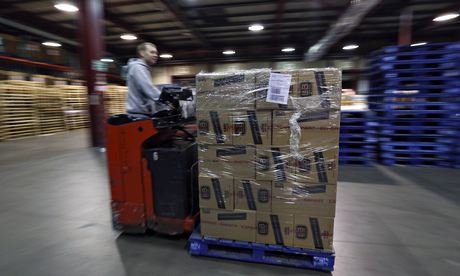Franchising, retail, business

24/04/2014
The mood in Britain's factories is at its most upbeat in more than 40 years, a survey by the CBI shows, in what could prove to be an important pre-election boost for the government.
A combination of strong growth in orders both at home and abroad is driving a rapid rise in confidence among manufacturers, according to the business lobby group.
The CBI said 41% of manufacturers surveyed were more optimistic about business than three months ago, with just 8% less optimistic. That gave a balance of +33 points – the highest since April 1973.
Rising optimism in the sector, which accounts for about 10% of the economy, is feeding through to plans for increased investment over the next 12 months, boosting hopes that the recovery will become more balanced, with a lesser reliance on consumer spending.
The chancellor welcomed the good news and said it was a reason why the government needed to "go on working through our economic plan".
Katja Hall, CBI chief policy director, said momentum in the sector was building. "Confidence is rapidly rising among British manufacturers, with a real sense of business optimism," she said. "Our industrial base is seizing a bigger role in the UK's economic recovery, with output, orders and hiring all on the up. Manufacturers plan to significantly ramp up investment in the year ahead."
Strength in the sector was highlighted by the latest car manufacturing figures, which showed that UK production jumped 12% in March compared with a year earlier, to 142,158 vehicles. The car industry has been held up by the government as a poster child for British manufacturing and exports, amid hopes that the economy can be weaned off its heavy reliance on debt-fuelled consumer spending and the financial services industry for growth.
Almost 80% of the cars made in Britain in March were built for export, according to the Society of Motor Manufacturers and Traders, which produced the figures. The trade body said the rise in car manufacturing in March was helped by new models rolling off the production line at Nissan's factory in Sunderland and at the Mini plant in Oxford, among others.
Britain's economy grew consistently throughout 2013 and first quarter growth in 2014 is expected to exceed the 0.7% increase in GDP achieved in the final three months of last year. The first official estimate will be published by the Office for National Statistics next week.
Minutes of the April meeting of the Bank of England's monetary policy committee, published on Wednesday, showed members believe the economy grew by about 1% between January and March.
The MPC said the UK's recovery was building momentum and becoming more balanced, with positive signs on investment. As the economy recovers, households should finally be able to look forward to a prolonged period of real wage rises, members concluded. Pay including bonuses rose by 1.7% over the three months to February, just ahead of the March inflation rate of 1.6%."Nominal wage growth had picked up a little in recent months and it was possible that a sustainable rise in real wages and incomes, consistent with a durable recovery in demand and output, was in prospect."
The MPC voted unanimously to leave interest rates on hold at 0.5% and quantitative easing unchanged at £375bn, having stressed in recent months that it is in no rush to raise rates.
There was further good news from the retail world, with the number of "full-time equivalent" jobs created in the sector up 1.8% over the first quarter, compared with a year earlier.
The rise, reported by the British Retail Consortium, echoes improvements in the wider jobs market over recent months.
A separate report by accountants EY and commissioned by the UK Onshore Operators Group estimated that the development of shale gas in the UK could create a £33bn investment opportunity for British businesses, with the potential for the creation of more than 64,000 jobs.
The strengthening recovery was also reflected in the latest government borrowing figures, which showed the chancellor defied expectations by meeting his 2013-14 target as a result of rising tax receipts.
Borrowing fell £7.5bn to £107.7bn, just below an official target of £107.8bn outlined in last month's budget by the Office for Budget Responsibility.
George Osborne was helped by a surge in stamp duty receipts, reflecting the recent strength of the UK housing market, as well as rises in income tax and VAT receipts.
The figures added further weight to the chancellor's long-held argument that cutting the deficit is central to building a long-term sustainable economic future for Britain. A spokesman for the Treasury said the figures were "evidence that the government's long term economic plan is working, delivering economic security for hard-working people".
Full-year borrowing as a percentage of gross domestic product fell from 7.4% in 2012-13 to 6.6%, which was the lowest since 2007-08 according to the figures from the ONS.
But Chris Leslie, shadow chief secretary to the Treasury, stressed that Osborne had missed his original targets. "A deficit this year of £107.7bn compared to the chancellor's claim in 2010 that it would be just £60bn is the cost of the three damaging years of flatlining and falling living standards we have seen since the election."
Fonte: theguardian.com